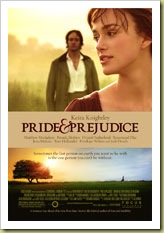Happy Holidays.
Wednesday, December 17, 2008
Monday, December 15, 2008
Pride and Prejudice: A Classic
Mrs. Bennet wants nothing more than to have her five daughters married off comfortably. So when she hears that Netherfield Park is being rented by a man, a certain Mr. Charles Bingley, who has an income of four to five thousand pounds a year, she insists that her daughters get acquainted with him. And the chance comes in the form of a public ball. The Bennet sisters are all in attendance, and the sisters Lydia and Kitty are delirious to be in the company of so many gentlemen. Elizabeth, the second of the Bennet sisters, and clearly the most witty and most spirited, does not give a thought at all on men or getting married. This prompted Jane, the eldest, to tease: 'One of these days, Lizzie, someone will catch your eye and then you'll have to watch your tongue.' And that someone is in the person of the darkly handsome and reticent Mr. Darcy, Mr. Bingley's friend. While Mr. Bingley and Jane seem to be drawn to each other, Mr. Darcy and Lizzie mutually dislike each other. Mr. Darcy thinks Lizzie 'barely tolerable' and Lizzie thinks him 'miserable'. Events continually bring them together, and Mr. Darcy begins to fall for Lizzie. There is, however, the problem about Lizzie's family, if not her fortune and stature in life: 'the lack of propriety shown by your mother, your three younger sisters, and even, on the occasion, your father.' There is probably attraction on the side of Lizzie, had not her prejudice of Mr. Darcy's personality stood in the way. While out in town, she meets Mr. Wickham, a handsome soldier in the militia. While she and Wickham are having a conversation along the fields of Meryton, Mr. Bingley and Mr. Darcy come along to invite the Bennet sisters to the former's ball. A chance encounter between Mr. Darcy and Wickham brings a rather curious reaction from both gentlemen, which impelled Lizzie to ask whether one knew the other. Wickham plunges into a narrative of his relationship with Mr. Darcy and how odiously the latter kept the former's will from him. This information causes Lizzie to loathe Mr. Darcy all the more.
Alas, news come that Mr. Bingley has left Netherfield Park without any intentions of returning. What brought such change of heart? Jane, to recover from the shock of the departure, is sent to London with the Gardiners, a close relations of the Bennets. Lizzie, on the other hand, receives an invitation from Charlotte Lucas, her close friend, who is now married to Lizzie's cousin, Mr. Collins. Surprisingly, she encounters Mr. Darcy and his cousin, Fitzwilliam. They are there to visit their aunt, Lady Catherine de Bourgh, whose residence encompasses even that of the Collinses. It is during her stay at Rosings that Lizzie circumstantially learns of Mr. Darcy's participation in the separation of Mr. Bingley and Jane. Hurt for her sister, Lizzie longs to be alone but is followed by Mr. Darcy and unexpectedly, for Lizzie, he proposes:
Miss Elizabeth, I have struggled in vain and I can bear it no longer. These past months have been a torment. I came to Rosings with the single object of seeing you...I had to see you. I have fought against my better judgment, my family's expectations, the inferiority of your birth by rank and circumstance. All these things I am willing to put aside and ask you to end my agony.
Lizzie, influenced by her prejudice, rejects him, laying down her reasons for doing so: first, Jane, and then, Wickham. Mr. Darcy leaves her with a letter explaining his behaviour to both persons.
Months pass, Lizzie is returned to her home, but she is bothered with the event that happened at Rosings, and her unreasonable prejudice of the man who had proposed to her. For want of fresh air, she joins the Gardiners in their tour of the country, which brings them to Pemberley, Mr. Darcy's estate. Much to Lizzie's relief, she hears that Mr. Darcy is not home. She was mistaken. Hearing someone playing a piano, she ventures to find out who it is, and she accidentally comes face to face with Mr. Darcy, who has just arrived from London. The acquaintance is renewed and the company would have been longer had not news of Lydia's elopement with Wickham reached Lizzie. Devastated, Lizzie returns home and helps calm her family from this shame, until they learn that Wickham had married Lydia. The family finds this improbable considering that Lydia had no fortune to offer Wickham. Lizzie later discovers of the role Mr. Darcy played in this union. She is touched; but realizes that Mr. Darcy is forever lost to her after the rejection at Rosings. And this was apparent when Mr. Darcy seemed to have nothing to say to her when he accompanied Mr. Bingley to propose to Jane. Months later, Lady Catherine de Bourgh visits the Bennets and confronts Lizzie of a rumour supposedly circulated by her that she, Lizzie, is to become the mistress of Pemberley. Lizzie denies this rumour but would not give Lady Catherine the satisfaction of promising that she will not reject a proposal if it will be made to her. Incensed, Lady Catherine leaves. The following morning, Lizzie is walking and is surprised to see Mr. Darcy, himself walking across the field towards her. Conversation ensues and Lizzie thanks Mr. Darcy for what he has done to Lydia and Jane. Mr. Darcy responds thus:
You must know...surely, you must know it was all for you. You are too generous to trifle with me. I believe you spoke with my aunt last night, and it has taught me to hope as I'd scarcely allowed myself before. If your feelings are still what they were last April, tell me so at once. My affections and wishes have not changed, but one word from you will silence me forever. If, however, your feelings have changed, I will have to tell you: you have bewitched me, body and soul, and I love you. I never wish to be parted from you from this day on.
I love the novel by Jane Austen and I was so happy with the way this movie came out. It is difficult to compress the whole book into a two-hour movie and retain the theme and important moments of the novel, but Joe Wright and screenwriter Deborah Moggach did an excellent job. The breathtaking fluidity from one scene to the next was commendable; the movie did not at all feel like it was chopped considering the numerous subplots in the novel. The casts were wonderfully selected and they delivered most splendidly. Keira Knightley as Elizabeth Bennet was perfect with her enchanting smile and lively portrayal of the heroine. While a newcomer, for me anyway, Matthew MacFadyen added humanity to the rather snobbish Mr. Darcy, and he had just the right awkwardness to make him even more desirable than he already is. He sure had chemistry with Knightley, and that was important. Yes, I expected a romantic movie as the novel from which the same was adapted is a romance novel, but I did not expect the movie to have such an impact. My heart leapt with every scene Elizabeth and Mr. Darcy was in, and I enjoyed the banter and grieved along with Elizabeth when she rejected Mr. Darcy and when she saw him again at Pemberley. I seem to have nothing negative to say about the movie except that I wished it was longer.
My quill wishes it too.
Saturday, December 6, 2008
Interview with the Vampire: As simple as that
San Francisco; the 20th century: Louis decides to tell his tale to young reporter Daniel Malloy. This is his story...
It was the year 1791. Louis de Pointe du Lac, an owner of a plantation in New Orleans, lost his wife, his daughter, and his will to live. He invited death from whoever he meets; but it was a vampire who accepted his invitation. Lestat de Lioncourt gave Louis his life of darkness; and while he was enthralled with Lestat's undead lifestyle at first, he soon abhorred the idea of killing humans for his own sustenance. Lestat feasted on fresh, young women, gilded youths, and delicate-tasting aristocrats. Louis, on the other hand, satiated himself with rats, chickens, and dogs. Louis grew despondent, and Lestat took it upon himself to create another vampire, a child, to keep Louis company. Claudia became Louis' child, and Lestat's pupil. Under both their cares, she flourished into a well-mannered yet ruthless killer. Until the night Claudia saw a naked woman and realized she could never be like her. She was forever a child, with only her eyes to tell the years she had lived. Full of hatred for her maker, Lestat, she arranged for his death, and together, she and Louis fled to Europe, intent on finding someone of their own kind. Armand, a 4oo-year old vampire, found them and invited them to The Theatre des Vampires, where vampires pretend to be humans pretending to be vampires. Louis had questions, and Armand held the answers. Louis felt that Armand would be a better teacher than Lestat, and he longed for his company. But there was Claudia to think about. Armand did not want the girl, and the whole troupe of vampires knew that Claudia broke a vampire commandment - do not kill your own. Just when Claudia was ready to let Louis go to Armand, having found a companion of her own, she and Louis were captured and sentenced to suffer for the death of a vampire: Louis, to spend eternity in a box; Claudia and her 'mother', imprisoned and exposed to the sun. Armand was able to rescue Louis, and when Louis was about to rescue Claudia, saw that he was too late. The 'mother and daughter' were reduced to ashes. Enraged, Louis burned the theatre and the vampires within. Having lost his only reason for living, Louis wandered Europe alone. In 1988, he returned to New Orleans and marvelled at the changes the world unravelled before his eyes. Within the confines of a rotting house, he saw a weak Lestat. Lestat invited him back, but Louis refused.
This vampire craze (with the release of Stephenie Meyer's Twilight Saga, and the movie adaptation out in theatres now) got me bringing out my copy of Interview with the Vampire. I will not dwell on the similarities and differences of the vampires according to Anne Rice and those of Meyer's. I will instead focus on what I thought of this particular movie, as it should be. First off, I honestly thought Tom Cruise was an oddity, cast-wise. There are a lot more who could portray Lestat as brilliantly as he should be portrayed. And when pitted together with the stellar, although short-lived, performance of Antonio Banderas, who played Armand, Cruise's lags far behind. As for Brad Pitt's Louis, I thought he was ok. He had his moments of glory but not so when he tries to bring forth the central theme which seemed to be the endless sadness of vampirism. And when you're asked to play this most important part, an 'ok' performance is not good enough. The biggest, and most delightful, surprise was Kirsten Dunst who played Claudia. She held her own court among a sea of famous and talented actors.
Now to the movie's plot. I'm not an Anne Rice reader, neither do I see myself as one in the near future. But I was fascinated with this movie because it depicts a creative look into that mystical world of vampires. More than being a mere Vampire 101, this movie digs deeper into the life of one vampire, who suddenly had moral issues regarding his vampirism. I see this movie as a double standard: for the movie-goers who aren't satisfied with merely being entertained by the movie they have to delve on the philosophical; and for those who couldn't care less about the philosophy talk and content themselves with determining whether the movie is worth their time or not. I was saddened with the life, or lack of it, that Louis was led into by Lestat. People are drawn to vampires, their beauty, strength, and sophistication. But when given the choice between death and eternal life of sadness, isn't death a welcome respite?
I rest my quill.



